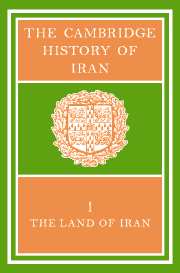Book contents
- Frontmatter
- PART 1 THE LAND
- PART 2 THE PEOPLE
- PART 3 ECONOMIC LIFE
- 15 MINERALS
- 16 INDUSTRIAL ACTIVITIES
- 17 COMMUNICATIONS, TRANSPORT, RETAIL TRADE AND SERVICES
- 18 AGRICULTURE
- 19 WATER USE IN NORTH-EAST IRAN
- 20 PASTORALISM, NOMADISM AND THE SOCIAL ANTHROPOLOGY OF IRAN
- 21 LAND REFORM IN IRAN
- PART 4 CONCLUSION
- Bibliography
- Conversion Tables
- Fig. I. Iran: physiographical.
- Plate Section
- Fig 85. Soil potentiality map of Iran.
- References
15 - MINERALS
from PART 3 - ECONOMIC LIFE
Published online by Cambridge University Press: 28 March 2008
- Frontmatter
- PART 1 THE LAND
- PART 2 THE PEOPLE
- PART 3 ECONOMIC LIFE
- 15 MINERALS
- 16 INDUSTRIAL ACTIVITIES
- 17 COMMUNICATIONS, TRANSPORT, RETAIL TRADE AND SERVICES
- 18 AGRICULTURE
- 19 WATER USE IN NORTH-EAST IRAN
- 20 PASTORALISM, NOMADISM AND THE SOCIAL ANTHROPOLOGY OF IRAN
- 21 LAND REFORM IN IRAN
- PART 4 CONCLUSION
- Bibliography
- Conversion Tables
- Fig. I. Iran: physiographical.
- Plate Section
- Fig 85. Soil potentiality map of Iran.
- References
Summary
Tales from The Arabian Nights, told by such accomplished and, it seemed, reliable narrators as Sinbad the Sailor, implanted the idea in many a boyish mind that Iran was a realm with fabulously rich mines. Early prints showed the Shahs wearing crowns encrusted with precious stones, and their raiments were decorated with gems. Samples of both are preserved in museums, and privileged visitors to Tehrān may to this day view the well-guarded Crown jewels of the Shāhan Shāh. Brightly lit glass cases house dazzling heaps of diamonds, rubies, emeralds, sapphires, and pearls. Stacked amongst this galaxy are pillars of golden coins, magnificent and massive medallions that have been seen only by a few numismatists and hardly ever by the general public. Finally there are precious stones built into masterpieces of the jeweller's art. These exhibits give verisimilitude to the attractive fairy tales. Mines there must be, but so far no mines of Ophir, no placers of Klondyke or rubies of Burma, no diamonds of Kimberley have been discovered in Iran: even the hoards of pearls amongst the Crown jewels come mainly from the Arabian coasts of the Persian Gulf.
The treasures on display and the wealth of the Shah are one result of a long-enduring political fashion. When one Eastern potentate used to visit another he took with him presents, following the custom set by the Queen of Sheba when she captivated Solomon. The remoter the source of the specimen, the greater the virtue of the gift. Iran did have the monopoly of turquoise for many years, but except in the medieval East turquoise was regarded as only semi-precious.
- Type
- Chapter
- Information
- The Cambridge History of Iran , pp. 487 - 516Publisher: Cambridge University PressPrint publication year: 1968

